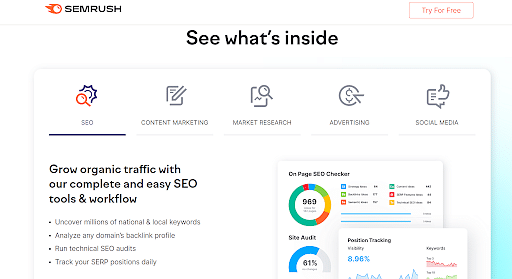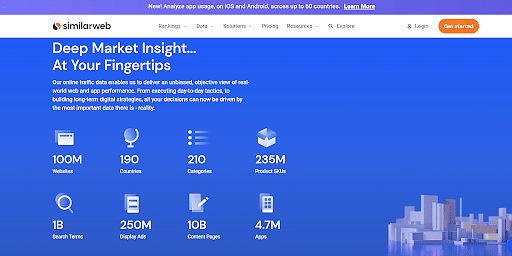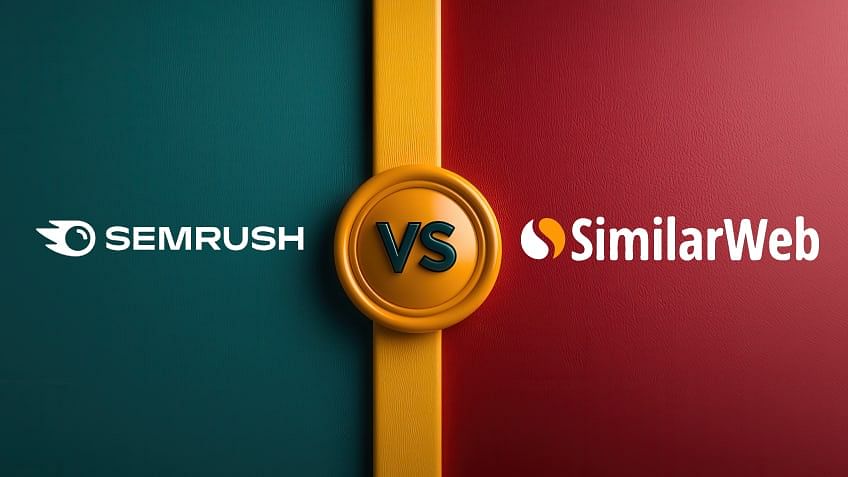What's better than getting insights into your competitors' keywords and web traffic? Several tools offer competitor benchmarking by collecting and processing traffic data. Semrush and SimilarWeb are popular platforms for performing meaningful analysis. While Semrush has ruled the industry for a long time, surprisingly, SimilarWeb has emerged to give it tough competition. Check out the following aspects of Semrush vs. SimilarWeb to understand the primary differences.
What Is Semrush?
Semrush is a leading online visibility management SaaS platform with over 21 international awards, 10M marketing professionals that have already used Semrush, and 30% Fortune 500 companies that use Semrush as their go-to marketing tool. Semrush enables businesses globally to run search engine optimization, pay-per-click, content, social media and competitive research campaigns and get measurable results from online marketing

Semrush Homepage
The all-in-one SEO tool and content platform. Semrush helps one build online visibility across popular channels. The most popular services offered by Semrush, include
- Helps you run successful marketing campaigns
- Assists in creating engaging content
- Facilitates high-volume, long-tail keyword research in 16 languages
- Allows efficient competitor analysis
- Helps in a website audit
- Provides an array of social media tools
What Is SimilarWeb?

SimilarWeb Homepage
A popular website analytics platform. SimilarWeb helps you with some aspects of SEO. The key services offered are as follows:
- Complete website analytics
- Powerful keyword research
- A limited-access free plan
- Estimates the total amount of traffic competitor websites get
- Allows you to view competitors' top traffic sources
Semrush vs SimilarWeb: Features
The following tables compare Semrush vs SimilarWeb for their features.
Keyword Research
|
Semrush |
SimilarWeb | |
|
Keyword overview |
YES |
YES |
|
Keyword sorting and comparison |
YES |
YES |
|
Keyword search |
YES |
YES |
|
Keyword lists |
YES |
YES |
On-Page and Technical SEO
|
Semrush |
SimilarWeb | |
|
Website analytics and audit |
YES |
YES |
|
SEO content template |
YES |
NO |
|
Competitor benchmarking |
YES |
YES |
Off-Page SEO
|
Semrush |
SimilarWeb | |
|
Backlink analytics |
YES |
YES |
|
Backlinks audit |
YES |
NO |
|
Link building |
YES |
NO |
|
Position tracking |
YES |
NO |
|
Bulk analysis |
YES |
NO |
|
Ranks |
YES |
YES |
|
Sensor |
YES |
NO |
Local SEO
|
Semrush |
SimilarWeb | |
|
Listing management |
YES |
NO |
|
Review management |
YES |
NO |
|
Local rankings |
YES |
NO |
Advertising
|
Semrush |
SimilarWeb | |
|
Keyword research |
YES |
YES |
|
Keyword grouping and management |
YES |
NO |
|
Competitor research |
YES |
YES |
|
Ad Builder |
YES |
NO |
Content Marketing
|
Semrush |
SimilarWeb | |
|
Content ideas and topic research |
YES |
NO |
|
Market research and trends analysis |
YES |
NO |
|
Content audit and analytics |
YES |
NO |
|
SEO writing assistant |
YES |
NO |
|
Content Optimization |
YES |
NO |
|
Post Tracking |
YES |
NO |
|
On-demand content marketplace |
YES |
NO |
Social Media Marketing
|
Semrush |
SimilarWeb | |
|
Social media management |
YES |
NO |
|
Social media content optimization |
YES |
NO |
|
Performance analysis and benchmarking |
YES |
NO |
Semrush vs SimilarWeb: Pricing
Semrush is more transparent towards its pricing plans. It has every detail enlisted clearly on its website.
Contrastingly, SimilarWeb does not mention the price. Its free plan does not offer much, and you must upgrade to a paid plan to explore its features.
Semrush
|
Plan |
Monthly Price |
|
Free |
$0 |
|
Pro +.Trends |
$319 |
|
Guru +.Trends |
$429 |
|
Business +.Trends |
$649 |
|
Enterprise |
Upon Request |
Note: Semrush also offers only a 7-day free trial. While Semrush offers a free trial and money-back guarantee, SimilarWeb does not.
SimilarWeb
|
Plan |
Monthly Price |
|
Free |
$0 |
|
Enterprise |
Custom |
Semrush vs SimilarWeb: Keyword Analysis
Both websites offer keyword analysis but differ in the following aspects.
SimilarWeb
SimilarWeb's keyword analysis function helps users in the following ways:
- Helps identify keywords for optimizing SEO, PPC, and content strategies.
- Monitors the progress of keywords and their corresponding traffic share
- Helps discover sites seemingly gaining or losing traffic from a specific set of keywords
- Allows you to leverage the information in discovering chief competitors or backlink partners
- Facilitates filtering the results to view top paid and organic competitors via keywords
- Analyze keywords through the CPC price estimation
A special SimilarWeb feature is the extrapolation of traffic trends from keywords. Using a traffic share graph, you can progressively track the traffic tendencies of five top sites capitalizing on a selected keyword.
Semrush
Semrush provides an organic keyword research feature that functions quite similar to SimilarWeb's Keyword research. The primary difference is that Semrush only delves into organic keywords. So, you will not be able to access information about paid keywords using Semrush.
Semrush helps you discover the following:
- The most strategic keywords for a website.
- Analyze keywords based on their respective search volume, overall traffic, CPC, and competitive density.
- Other websites capitalize organically on the particular keywords.
Additionally, Semrush offers a unique tool named “Keyword Magic Tool”. It takes keyword research beyond basic operations and focuses on the real intricacies. It helps you evaluate general keyword difficulty while determining all the ranking parameters initiated by the keywords. The best part is that it lets you view the trendiest search questions containing the specified keyword.
Another unique feature is the Semrush site audit tool. It crawls through your entire website to figure out possible mistakes in the keywords and SEO elements that might be holding back your rank. So, the winning shot goes to Semrush as it manages to reinforce everything further via the site audit tool, PPC keyword tool, and Keyword Magic Tool.
Semrush vs SimilarWeb: Data Collection
Data collection is the most integral part of generating reports and analyzing websites.
SimilarWeb
It uses the following data sources:
- Direct data from website owners
- Public data sources
- Anonymized panel data from browser extensions
- From partners and internet providers
Semrush
Semrush generates traffic analytics reports based on:
- Anonymized data gathered from third-party sources
- Anonymized behavioral data based on internet users
- Public APIs of social media networks
- Other relevant data sources for each marketing sphere
Semrush vs SimilarWeb: Competitor Analysis
Both systematically compare websites by parameters such as traffic amount, session duration, bounce rate, and more.
SimilarWeb wins points in deeper website and session analysis as it allows you to discover additional information about competitors' pages as well as their traffic surfing sessions. But Semrush compensates for this feature by revealing your competitors' social media marketing strategies and ad spending.
Overall the two are at par in terms of competitor analysis.
Semrush vs SimilarWeb: Social Media Analysis
While SimilarWeb is not a go-to solution for social media analysis because it does not offer:
- Social media content optimization
- Social media management
- Performance analysis and benchmarking
The farthest SimilarWeb goes in this field is for traffic analysis, i.e., it helps analyze the traffic generated from social media.
Contrastingly, Semrush wins hands down as it digs deeper into the social media pages and reveals important details for social strategies. It favors its users in tracking their rivals' social media activities, keeping tabs on their content, posting frequencies, and proven engagement practices.
Other Differentiating Features of Semrush
- This allows you to explore competitors’ website traffic stats, discover growth points, and amplify your marketing strategy.
- You also get daily/weekly/monthly traffic of your competitors in mobile or desktop data, with forecasts for the future of your competitors' traffic and metrics.
- The Insights section of the Top Pages report lists pages on your selected domain that are newly detected, declining in traffic, or growing in traffic.
- Semrush Traffic Analytics reports are based on petabytes of clickstream data that comes from multiple proprietary and 3rd party data sources, Semrush’s proprietary AI and machine learning algorithms, and Big Data technologies. The data is accumulated and approximated from the user behavior of over 200 million real internet users and over a hundred different apps and browser extensions. Traffic Analytics data is not obtained from any website’s internal analytics.
2. Market Explorer: This allows you to gain insights into any industry and benchmark yourself against competitors with Semrush’s all-in-one market research software.
3. EyeOn: From new content to promo shifts, EyeOn competitor monitoring makes tracking your rivals’ online marketing activity simple.
4. One2Target: A complete audience analytics solution to help understand your market’s audience and how they engage online.
Conclusion
You can master Semrush and other key SEO skills and tools with our unique Digital Marketing Specialist program and become a pro in just 8 months! Explore and enroll today!
